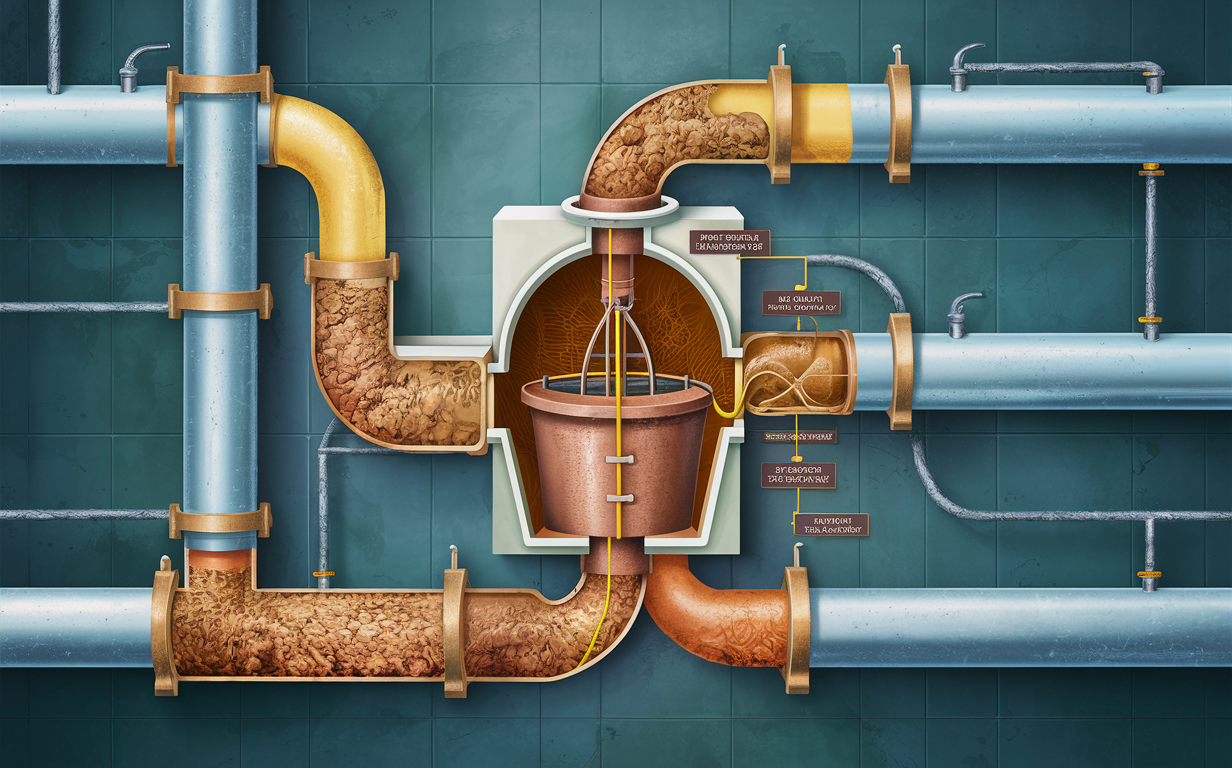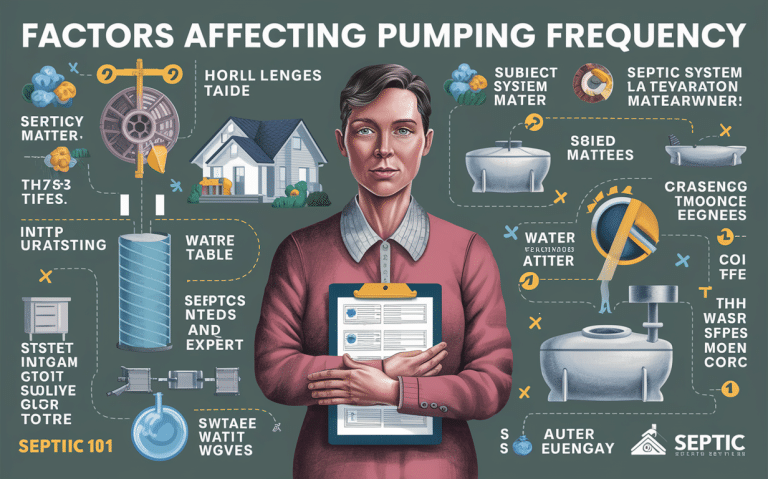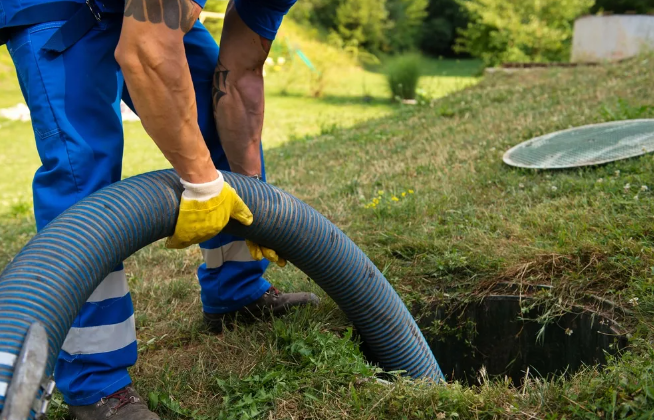Discover the Recommended Septic Tank Pumping Frequency Now!
Septic tanks are an essential part of any home not connected to a municipal sewer system. Knowing the recommended septic tank pumping frequency is crucial to maintaining a healthy and efficient system.
Failing to pump your septic tank regularly can lead to various issues, including backups, system failures, and costly repairs.
Key Takeaways
- Septic tank pumping should typically be done every 3-5 years.
- Factors like household size, tank size, and water usage can influence pumping frequency.
- Regular inspections and maintenance can extend the life of your septic system.
Understanding Septic Tank Functionality
Before diving into the recommended pumping frequency, it’s essential to understand how a septic tank works. A septic system is an underground structure that treats wastewater. It consists of a septic tank and a soil absorption field.
The tank collects wastewater from your home and allows solids to settle at the bottom, forming sludge. The liquid, called effluent, flows out into the absorption field, where it’s naturally filtered by the soil.
Factors Influencing Pumping Frequency
Household Size
The number of people living in your home directly affects how often you should pump your septic tank. More people generate more wastewater, which fills up the tank faster.
Tank Size
Larger septic tanks can hold more wastewater, potentially extending the time between pumpings. Conversely, smaller tanks will need more frequent attention.
Water Usage
High water usage can fill up your septic tank more quickly. Households that use a lot of water for activities like laundry, dishwashing, and long showers will need to pump their tanks more often.
Solids in Wastewater
The more solids you flush down the drain, the faster your tank will fill up. Disposing of items like diapers, coffee grounds, and grease can lead to a quicker need for pumping.
How to Know When Your Septic Tank Is Full
Foul Odors
One of the most apparent signs your septic tank is full is the presence of foul odors near your drain field or inside your home.
Slow Drains
If your sinks, bathtubs, or toilets are draining slowly, it could be due to a full septic tank.
Sewage Backup
This is a severe issue that indicates your septic system needs immediate attention. Sewage backups can pose health hazards and should be addressed by a professional.
Recommended Septic Tank Pumping Frequency
Based on the factors mentioned, the general recommendation for septic tank pumping is every 3-5 years. However, this can vary depending on your specific situation:
| Household Size | Tank Size (Gallons) | Pumping Frequency (Years) |
|---|---|---|
| 1-2 persons | 500-750 | 5 |
| 3-4 persons | 1000-1250 | 3-4 |
| 5-6 persons | 1500-2000 | 2-3 |
Custom Recommendations
For the most accurate pumping schedule, consult with a septic service professional who can assess your system’s needs based on these factors.
Tips for Maintaining Your Septic System
Regular Inspections
Conduct regular inspections of your septic system to ensure everything is functioning correctly. This can help you catch issues before they become major problems.
Water Conservation
Reducing water usage in your home can extend the time between septic tank pumpings. Install water-saving fixtures and practice water conservation habits.
Avoid Flushing Non-Biodegradable Items
Only flush biodegradable items down your drains. Avoid flushing diapers, feminine hygiene products, and other non-degradable items that can clog your septic system.
Use Enzyme Additives
Enzyme additives can help break down solid waste in your septic tank, making it more efficient and extending the time between pumpings.
Common Myths About Septic Tank Pumping
Pumping is Only Needed When There’s a Problem
Waiting until there’s an issue to pump your septic tank can lead to costly repairs. Regular maintenance is essential for a healthy system.
Additives Eliminate the Need for Pumping
While additives can help break down waste, they do not eliminate the need for regular pumping.
Septic Systems Last Forever Without Maintenance
Like any other part of your home, septic systems require regular maintenance to function correctly and last longer.
What to Expect During a Septic Tank Pumping
When you schedule a septic tank pumping, a professional will come to your home and locate your septic tank. They will remove the lid and use a specialized vacuum truck to pump out the sludge and effluent.
The process usually takes a few hours, and afterward, the technician will inspect your tank for any signs of damage or issues.
Post-Pumping Inspection
After pumping, it’s essential to have your septic tank inspected. This can help identify any potential problems, such as cracks or leaks, that need to be addressed.
Pumping Costs
The cost of septic tank pumping can vary based on your location and the size of your tank. On average, you can expect to pay between $200 and $500. Regular maintenance can help you avoid more costly repairs down the line.
Signs You Need to Pump Your Septic Tank Sooner

While the recommended frequency is every 3-5 years, certain signs indicate you may need to pump your tank sooner:
- Pooling Water: If you notice water pooling around your drain field, it could be a sign your septic tank is full.
- Sewer Backup: Any sign of sewage backing up into your home needs immediate attention.
- Lush Grass: Unusually green and lush grass over your drain field can indicate a leak or full tank.
Professional Septic Services
Importance of Hiring Professionals
Hiring a professional for septic tank pumping ensures the job is done correctly and safely. Professionals have the necessary equipment and expertise to handle the things efficiently.
Service Packages
Many septic service companies offer maintenance packages that include regular inspections and pumping. These packages can save you money and ensure your system is well-maintained.
Emergency Services
In the case of a septic emergency, such as a backup or leak, many companies offer 24/7 emergency services to address the issue promptly.
DIY Septic Tank Maintenance
Can You Pump Your Own Septic Tank?
While it is possible to pump your own septic tank, it is not recommended. The process requires specialized equipment and knowledge to ensure safety and effectiveness.
Simple Maintenance Tasks
Homeowners can perform simple maintenance tasks, such as conserving water and avoiding flushing harmful items, to help maintain their septic system between professional services.
Benefits of Regular Septic Tank Pumping

Extends System Life
Regular pumping can extend the life of your septic system by preventing buildup and clogs that can cause damage.
Prevents Costly Repairs
By maintaining your septic tank, you can avoid costly repairs and replacements. Regular pumping helps keep your system in good working order.
Protects Your Property
A well-maintained septic system protects your property from potential damage caused by leaks and backups.
Environmental Impact of Septic Systems

Properly maintained septic systems are environmentally friendly. They treat wastewater naturally, reducing the risk of contamination to local water sources. Regular pumping helps ensure your septic system remains eco-friendly and efficient.
Conclusion
Understanding the recommended septic tank pumping frequency and adhering to regular maintenance schedules can save you time, money, and headaches. By considering factors like household size, tank size, and water usage, you can determine the best pumping schedule for your home.
Regular inspections and professional services will help keep your septic system running smoothly and efficiently for years to come. Call us for a free estimate and to learn more at (845) 637-3544!
By following these guidelines and maintaining your septic system, you can enjoy a worry-free wastewater solution that protects your home and the environment.
Additional Resources
For more information on septic tank maintenance and services, visit United Sewer & Septic.
Comparison of Septic System Types
| System Type | Pros | Cons |
|---|---|---|
| Conventional | Cost-effective, easy to install | Requires more land space |
| Aerobic Treatment | Efficient, treats wastewater well | Higher maintenance, costlier |
| Mound Systems | Suitable for poor soil | High installation cost |
| Chamber Systems | Easier installation, flexible design | May require frequent maintenance |
Common Septic Tank Pumping Mistakes
- Neglecting regular pumping schedules
- Flushing inappropriate items down the drain
- Using excessive water
- Ignoring signs of septic issues
- Attempting DIY repairs without proper knowledge







